Impact
Theory of Change
 Theory of Change
In 1986, Martha Nussbaum wrote the Fragility of Goodness.
Theory of Change
In 1986, Martha Nussbaum wrote the Fragility of Goodness.
The book is still in our reading list! But what is not, are her brilliant ideas about human development. Development has been broken for too long, for we have imagined it to be driven by the economics of welfare.
There is a missing link.

Our obsession for books, a passion for working with children and the Capability Approach for Human Development inspires our Theory of Change.
Paper is the oldest, articulate means for humanity.
It can be used to write and draw to tell stories. We started there. Now, add a QR code and a Raspberry Pi to power the code, you have a breakthrough classroom. And that is where we are now.
$1 Classroom
We are integrating Paper and Raspberry Pi to create a pioneering classroom for children in adversity. It costs just $1 per child per year. If you look closely you will perhaps see like we do, how a simple sheet of paper can be a powerful vehicle for the empowerment of a community through the development of its children.
Download our framework for change.
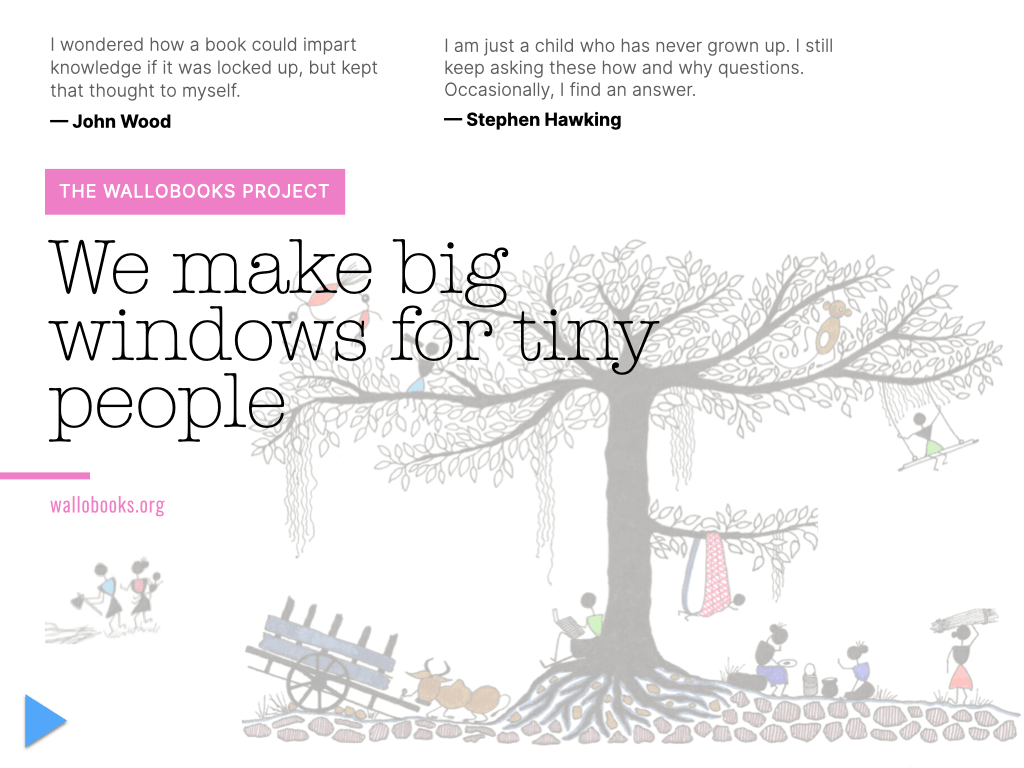
How we measure change?
 How we measure change?
Measurement is the first mile for development.
How we measure change?
Measurement is the first mile for development.
In the act of gathering developmental insight, a respondent fills up a form. A stack of forms end up on a desk and are converted to rows on a spreadsheet.
An analyst crunches the rows and comes up with an insight — 35% of girls in Gujarat in India drop out from school in Std VIII. What happens to the girl behind the percentage, behind the rows, behind the forms? For often an entire decade, this percentage is the basis for policy and intervention.
They constitute the forgotten demographic.
The unit of analysis in policymaking is a deeply dependent vulnerable subject. Assuming universality and constancy of vulnerability is a dangerous starting point for insight, as it treats citizens as recipients of development rather than as stakeholders.
The gathering of data comes up against a range of biases. Flaws and inaccuracies creep into problem formulation and subsequently, result in suboptimal outcomes for developmental interventions.
We have developed a unique capability to execute longitudinal studies for children and communities in adversity that can transform outcomes in education.
Partner with us.
Schedule a call with us to change education together.
The WHO UNICEF JMP influences WASH policy in 200+ countries. It uses the following question to gather data on availability of drinking water -- In the last month, has there been any time when your household did not have sufficient quantities of drinking water when needed?
An approach like this is bound to result in flawed data as it doesn’t place any additional cognitive burden on the respondent.
Mail me to know more about our pioneering approach to measurement that focuses on the capability of individuals rather than their vulnerability.
 Udayan Guha
Udayan Guha
Board of Believers
2019 Impact Report
2019 Impact ReportAny effort in development is a drop in the ocean.
Midway through writing our Impact Report for 2019, we realised the inadequacy of our ideas, actions and results. The question, that came up again and again is -- So, what?
This is a narrative of our failure.
Read our story and tell us what we could have done better.
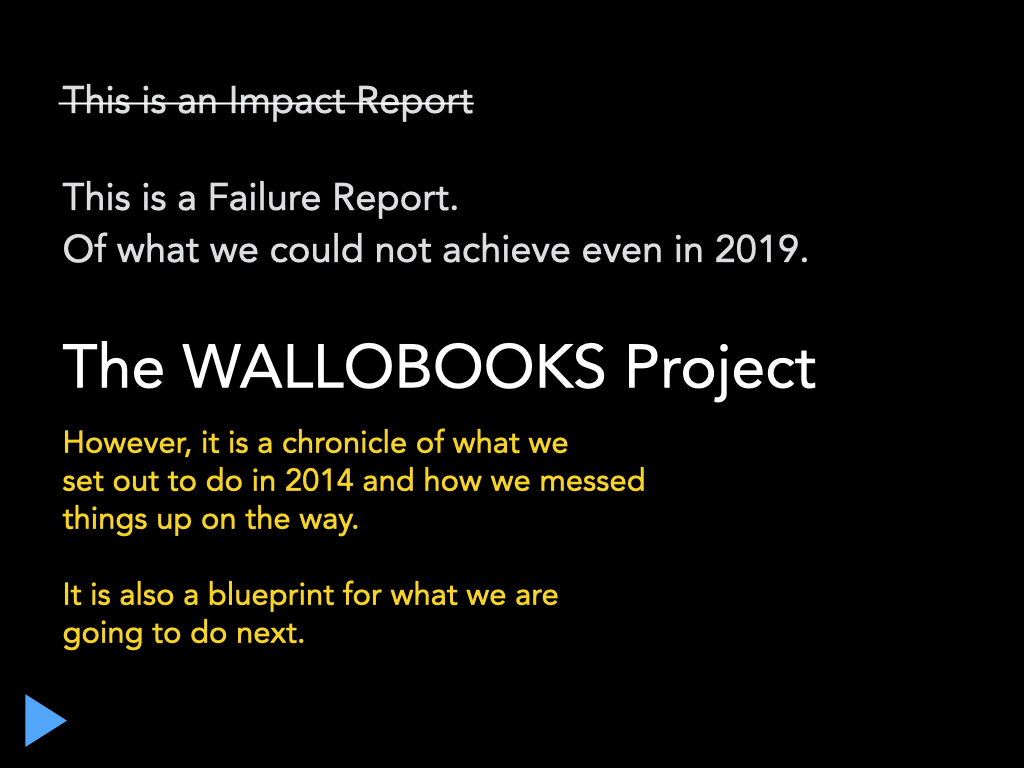 I am from Gosaba, a beautiful village in the Sunderbans. I used to be a brick layer. Children go to school but seldom get an opportunity to read a storybook. I have a son, Sayan. He is 10 this year. I want him to read all the stories in the world so that he can grow up to become tall and wise.
I am from Gosaba, a beautiful village in the Sunderbans. I used to be a brick layer. Children go to school but seldom get an opportunity to read a storybook. I have a son, Sayan. He is 10 this year. I want him to read all the stories in the world so that he can grow up to become tall and wise.
Mail me to talk about how storybooks can create a window to the world for children who are not privileged.
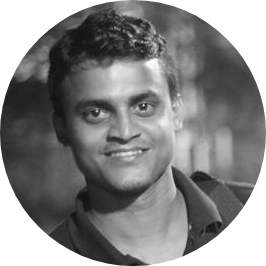 Ganesh Raptan
Ganesh Raptan
Project Leader
2020 Impact Report
2020 Impact ReportThe Unlearn Academy
Inspired by the TESSA Model we are setting up a Teacher Academy to support them to innovate, and gain a diploma without having to step out of their classroom.
Teachers are the first mile of hope.
Download our report and concept note for the Unlearn Academy.
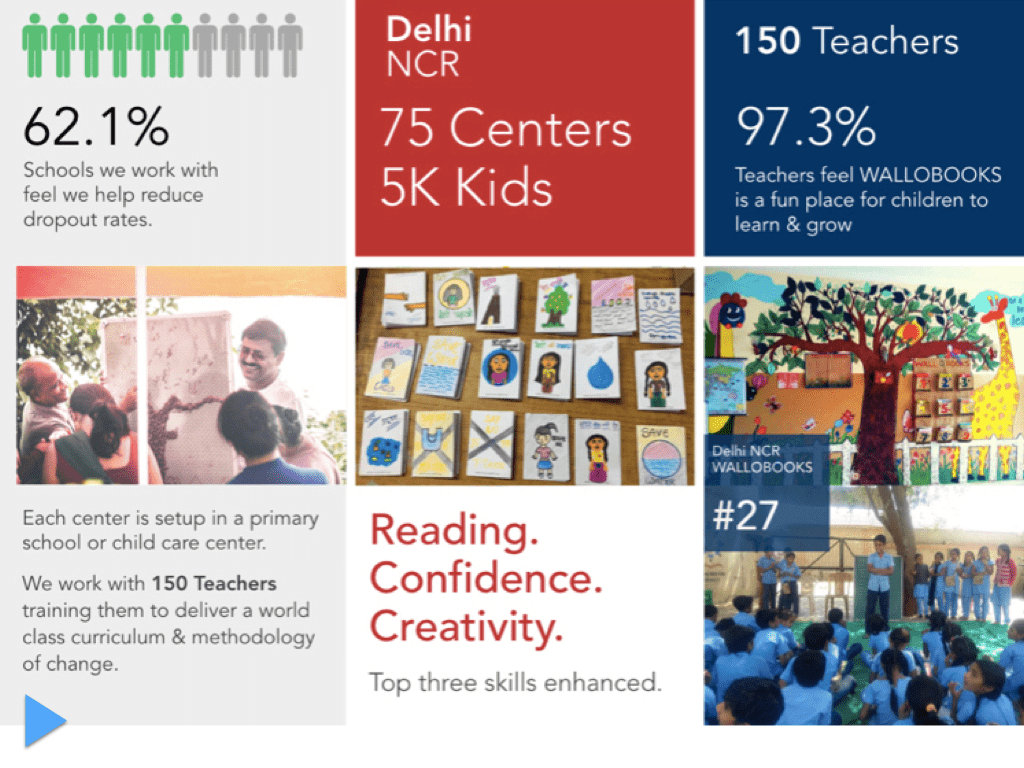 A key objective for education in developing nations across Asia, Africa and Latin America is to ultimately graduate young adults with the ability to contribute directly and substantially to the livelihood of their families. The cycle of poverty in the Global South span only a year. If crops fail, families encounter financial catastrophe immediately.
A key objective for education in developing nations across Asia, Africa and Latin America is to ultimately graduate young adults with the ability to contribute directly and substantially to the livelihood of their families. The cycle of poverty in the Global South span only a year. If crops fail, families encounter financial catastrophe immediately.
The cycle of education on the other hand is 16 years, or at least 12 years. It takes that much time for a young adult to connect her education to livelihood outcomes for her family in a direct and substantial way.
Mail me to learn about how we implement large scale change programs in education.
PS. I love to travel. Do visit my weird, tiny travel channel on Youtube.
 Debanjana Bonnerjee
Debanjana Bonnerjee
Program Director
Kiran --
The Village of the Pilgrims
Kiran's Story --
The Village of the Pilgrims
Kiran lives in a village called Sayla, in Gujarat.
Did you know that the name of her village means, the Village of the Pilgrims? A woodcutter is chopping away all the trees in Sayla.
Download a story of how we worked with Kiran, her little friends and the Aga Khan Development Network to transform children, parent and community outcomes in her village.
 The ASER Annual State of Education Study reports how over 70% of young adult women in India between the ages of 14 and 18 do not know how to calculate a 10% discount. Neither do they know how to read expiry dates on medicine strips, or the instructions on an ORS Rehydration Kit, or if a food item has expired or not.
The ASER Annual State of Education Study reports how over 70% of young adult women in India between the ages of 14 and 18 do not know how to calculate a 10% discount. Neither do they know how to read expiry dates on medicine strips, or the instructions on an ORS Rehydration Kit, or if a food item has expired or not.
Little disadvantages like this can cripple entire families in time and disrupt the demographic dividend of nations.
Mail me to learn about how we help children take home important lifeskills for their families.
 Devanjali Roy
Devanjali Roy
Editor
Dinesh --
I am breaking a wall
Dinesh's Story --
I am breaking a wall
Teachers are the last mile of hope.
We work with hundreds of teachers in communities facing adversity, so that they can break the walls that surround their children. We asked them what they feel about our approach to change in education.
This is what Dinesh said.
View a Youtube playlist of all of them.
Information, Distribution & Empowerment constitute the last mile for development. Accentuating the role of institutions rather than the capability of individuals is the usual norm in the developing world.
An asymmetry of information, distribution and empowerment restricts inclusion, leading to developmental interventions that may be lead by efficient institutions but are seldom effective.
Mail me to discuss how we help the teachers we serve reach their full potential.
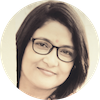 Krishna Acharya
Krishna Acharya
Project Leader
Neetu --
I too can draw
Neetu's Story --
I too can drawShe likes to draw birds and flowers.
Neetu is 52 years old. Her struggle for life started at a tender age. At the age of 15, as a domestic help.
She recently decided to start a new career to become a professional illustrator for children's books.
Neetu, like 92% of India’s workforce absorbed into the informal economic sector, without any possible alternative. We have started the Say, Sister Project to connect Neetu to the global knowledge economy for illustrations.
This is her story.
Discover her funny and weird drawings.
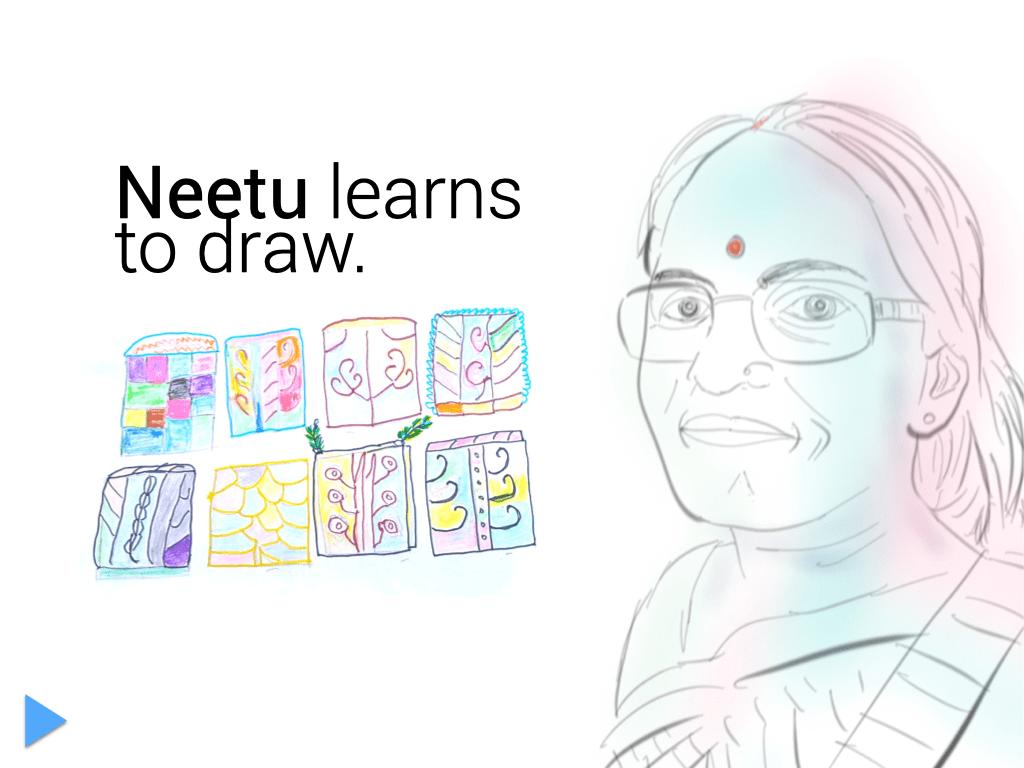 I love to draw, just like Neetu.
I love to draw, just like Neetu.
The WARLI form of art uses the basic shapes of a a circle, square and triangle to make remarkable illustrations possible. I believe that anybody can learn how to illustrate. It is empowering, fun and an employable skill.
Mail me to discuss how we plan to train women in remote communities to learn how to illustrate. Perhaps, you specialize in one of the myriad forms of art and can teach them too.
 Sona Ram
Sona Ram
Board of Believers
Jayita --
I want to learn
Jayita's Story --
I want to learn
Aila, Bulbul, Jayita
Cyclones in the Sunderbans have endearing names like the women who live here. For a million women, stranded in these estuaries between India and Bangladesh, the highway of inclusion stops at the river.
Jayita, a 29 year old woman is a mother of two, lives here. At 16, she dropped out of school. Like Neetu, Jayita wants to learn again and earn for her family.
This is Jayita's story.
Read how the Say, Sister Project is helping Jayita get other women in her village back to school.
A study in the Sunderbans revealed that more than 50% of women live in abject poverty. Illiteracy among them is highly prevalent. Their social participation is also very low, almost 68%. Significant number of women are dry fish workers as there are no viable alternatives.
In these ultra-remote communities, women practice the traditional Bengali folk art of Alpana. Handed down through generations, paintings which adorn the walls and floors of houses, where finger is the brush and a paste comprising of mainly rice powder is the paint.
There is a global market of illustration which does not equate the demand supply curve.The global illustration marketplace is a meritocracy. It doesn't depend on age or qualification but only on competency.
Mail me to know more about the Say, Sister project in the Sunderbans.
PS. I am also a part of Spriha - a group of young professionals aiming to promote health and education and striving towards achieving a gender just society. Support it's efforts to distribute aid to the people in the Sunderbans affected by Cyclone Yaas.
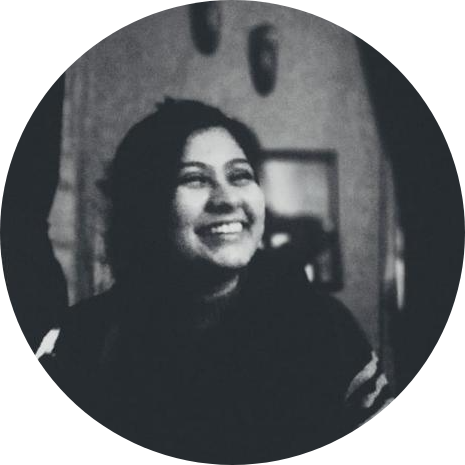 Debpriya Adhikary
Debpriya Adhikary
Project Leader

Dhiman Ghosh
I am Dhiman Ghosh.
Everybody here says, I make wonderful tea. I am a college dropout and many years ago, used to sell tea out of a small shop, my father gave me to run. They also say here, that I am good with numbers. So now I have given up counting what roles I play in our tiny organization.
My love for books remain intact, and so when I am not running about or counting the tons of things we account for, I dive into a fantastic staircase library in our office.
We have created a frugal, but amazing organization about to change education for children at the bottom of the pyramid.
This is my story.
I invite you to connect with all of us here. Yes, you can write to me to discuss my favorite detectives, and if you care to visit our city, you are up for an excellent cup of tea.
 Dhiman Ghosh
Dhiman Ghosh
Chief Archivist and Tea Maker